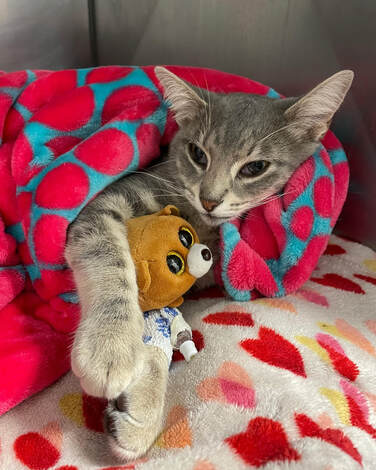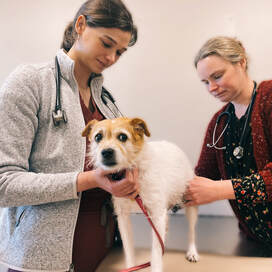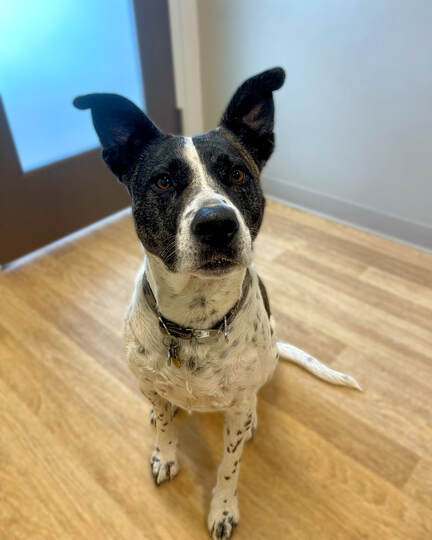 If your pet is exhibiting: vomiting, diarrhea, or lack of appetite You can try: A bland diet of white rice and boiled chicken or hamburger. This meal is packed full of simple carbs and proteins, and boiling the meat will remove excess fat to lower strain on the GI tract. If your pet has recently vomited, fast them for 6-12 hours before starting the bland diet, though pets younger than 16 weeks should not be fasted.. If they don’t seem interested in food, try adding a bit of chicken broth to entice them, and leave food out so they can come back to graze at their leisure. Once your pet’s GI symptoms have returned to normal, gradually wean them back to their regular diet over the course of a few days to avoid any shock to their digestive system. But call us if: Your observe symptoms such as lethargy, odd behavior, blood in stool or vomit, worms in feces, or pain contact a veterinary hospital immediately. If soft stool persists for 24 hours or turns into watery diarrhea or if your pet vomits more than twice your pet should be seen by a doctor. If your pet is exhibiting: itchiness, scratching, eye irritation, coughing, or sneezing You can try: Benadryl! The above symptoms can all be signs of allergies, and the over-the-counter antihistamine Benadryl can also be used in dogs and cats. Dosing guidelines are 1 mg per pound of body weight (with a standard Benadryl tablet being 25 mg), given every 8-12 hours as needed. Be sure to buy standard, original formula tablets, since some flavored or chewable versions can have ingredients that are harmful to pets. Antihistamines can also cause a bit of drowsiness in animals just as with humans, so be sure to keep a close eye on your pet after giving one. But call us if: Your pet’s symptoms don’t respond to Benadryl, you notice eye discharge with a green or yellow tint, your pet is scratching at an area of skin that is discolored or has an odor, or your pet’s coughing or sneezing becomes productive. These are all common signs of infection and typically require treatment to resolve.  If your pet is exhibiting: limping, stiffness, or soreness You can try: Limiting your pet’s activity. While stiffness or difficulty moving can be signs of an injury or other condition that requires medical attention, they can often be a case of “played too hard yesterday” or “slept on it funny last night.” Allow your pet to rest anything they may have agitated by limiting their activity for a few days; keep them on a short leash during walks, prevent them from running and jumping, and avoid high-impact play sessions. Unfortunately there aren’t any over-the-counter painkillers that are safe for animals, so avoid giving medications such as aspirin or ibuprofen. But call us if: Your pet is showing signs of pain or distress, they aren't feeling better after 2-3 days of limited activity, or their symptoms start to get worse rather than better. These could indicate a more serious injury that needs attention to heal properly, or one of the various tick borne diseases that are prevalent in this area. If your pet is in pain there are also a few prescription strength painkillers and anti-inflammatory drugs a veterinarian can prescribe that can keep them comfortable during their recovery. If your pet is exhibiting: tick bites You can try: Plucking the tick out with tweezers and monitoring. If your pet is on a flea and tick preventative and vaccinated against lyme disease, there’s not much to worry about here. Ticks have to be embedded for upwards of 24 hours to transmit most diseases, so while oral flea and tick preventatives don’t stop ticks from biting they do kill them quickly enough to avert this risk. It can also take upwards of a month for tick borne diseases to show up on a blood test or for symptoms to present, so there’s rarely a benefit to bringing a pet in immediately after they’ve been bitten. But call us if: Your pet begins to exhibit soreness, stiffness, fever, vomiting, diarrhea, or lethargy. These are all common symptoms of tick borne diseases, and if these present after a tick bite it’s time to have your pet checked out. If your pet is exhibiting: new lumps or bumps You can try: Monitoring the lump for a week to watch for any changes. Pets can get strange lumps on their bodies just the same as us, and often they’re harmless deposits of fat, skin tags, or benign tumors. While it never hurts to err on the side of caution, monitoring the bump for a little while can give a better sense of what we’re dealing with. Sometimes photographs can be enough to identify the lump as well, so if you’ve got one feel free to text (978-369-3503) or email ([email protected]) it over! But call us if: The lump grows visibly larger, is sensitive to the touch, ruptures or oozes, or has not gone down in size after a week.  While we’ve packed this article full of as much helpful information as we could, there’s so much we don’t have space to cover! This guide is intended to be a first resource, rather than a be-all end-all, and nothing here serves as a replacement for seeing a veterinarian. It can be hard to figure out when it’s time to pick up the phone, and sometimes folks worry about bothering us with so-called stupid questions, but we’d always prefer you call us if you’re not sure. After all, it’s what we’re here for! Comments are closed.
|
|
OFFICE HOURS:
Monday-Friday: 8:00 am to 6:00 pm Saturday: 8:00 am to 12:00 pm |
CONTACT INFORMATION:
Concord Animal Hospital 245 Baker Avenue Concord, MA 01742 Phone: (978) 369-3503 Fax: (978) 371-9748 [email protected] |
JOIN OUR PACK!
Sign up for our monthly newsletter, the Paw Press for hospital news, pet care tips and cute pet photos! |
Copyright © 2022

